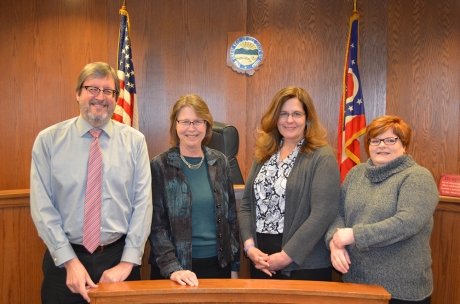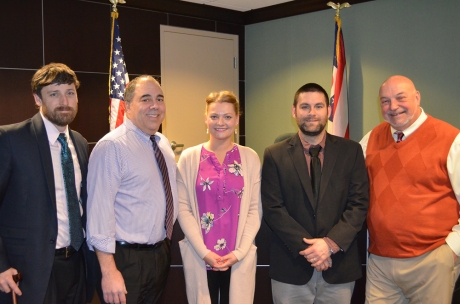Login | April 16, 2024
New Portage County Juvenile Court program puts `Children First’
Portage County Juvenile/Probate Judge Robert Berger unveiled the court's new Children First Program in October. The two-day program is designed to help the unique issues faced by unmarried parents who don't live together. Parent Class Educators are (from left to right): Magistrate Joseph Szymanski, Magistrate Roxana Lyle, Educator Catherine Schoenewald and Andrea Warner-Stidham.


TRACEY BLAIR
Legal News Reporter
Published: June 22, 2018
Ever since Robert Berger first became Portage County’s juvenile/probate judge in 2015, he has seen a great need for a parenting class.
More specifically, he has wanted to help address the specific issues parents who are unmarried and not living together face after filing actions in Juvenile Court for custody, visitation and paternity matters.
“We want to stop the adversarial attitude before it begins. This is a tough population because they could have been together for one night, or for 20 years,” Judge Berger said.
Last October, Berger unveiled the court’s new Children First Program.
Modeled after a program in Stark County, it is not the usual seminar-type course of study.
Children First is a two-day program held on the second and third Tuesday of each month (except December).
The first Tuesday is the educational portion and the second Tuesday is a work session with attorney mediators who help the parties resolve their own issues without needing court intervention.
“In the first session, they come in and listen to a 20-minute tape from me telling them how they can grow as parents,” said the judge. “We also emphasize the harmful effects of alcohol and drugs. Two registered nurses come in. We try to teach them to develop respect and trust to work together with parenting schedules with one voice. There is also role playing to show that when parents work together, they are less likely to have children who have problems such as delinquency.
“We try to show them it’s about the child being well-loved. The last thing they want is parents pointing fingers at each other. You want them working in the best interests of the child. You try to get them to forgive each other and work together, and to make them see that children want to have both parents they can identify with. I tell them, `Parents don’t have the First Amendment right to free speech. You have to watch what you say and do.’ “
The free program, which was started with a Job & Family Services grant, is paid for with filing fees.
The judge alternates with magistrates to preside over Children First.
Deputy sheriffs provide security, and anyone who wants a mediation hearing can have one immediately since a judge or magistrate is already there.
“Anyone without a child support order has that done too,” Judge Berger added. “Before everyone leaves, they know when their next hearing is.”
The judge said he has received good feedback so far from Children First graduates.
“The first night, most of the women are on one side of the room, the men on the other,” he said. “On the second night, they are sitting together. The people take to it. Everyone wants what’s best for their child.”
The court’s chief magistrate, Joseph Szymanski, said the program was badly needed.
“Children pick up on bad vibes between the parents,” Szymanski said. “Parents get especially upset when the other parent gets a new relationship.
“I once had a case that was set for 75 hearings over 17 years! I hold a printout of that case before the (Children First) class to show the parents.”
The magistrate said attorneys also appreciate the Children First program.
“Most attorneys really don’t want to go to trial,” said Szymanski. “A lot of the program is just common sense. Some of it involves people who only knew each other a night, or a weekend. They don’t even know each other, how are they supposed to know how to raise a kid together? Sometimes, the issues are as simple as, when is visitation? Other times, it’s, `I don’t want you to see the kid at all.’ “
So far, more than 80 couples have gone through the program, which can help a maximum of 10 couples at a time.
“For us, it’s been very successful,” Judge Berger said. “At the very least, it plants a mustard seed as to how parents can get along.”

